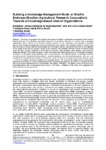Por favor, use este identificador para citar o enlazar este ítem:
http://www.alice.cnptia.embrapa.br/alice/handle/doc/933995Registro completo de metadatos
| Campo DC | Valor | Lengua/Idioma |
|---|---|---|
| dc.contributor.author | ALVARENGA NETO, R. C. D. de | pt_BR |
| dc.contributor.author | VIEIRA, J. L. G. | pt_BR |
| dc.date.accessioned | 2012-09-18T11:11:11Z | pt_BR |
| dc.date.available | 2012-09-18T11:11:11Z | pt_BR |
| dc.date.created | 2012-09-18 | pt_BR |
| dc.date.issued | 2012 | pt_BR |
| dc.identifier.citation | The Electronic Journal of Knowledge Management, v. 9, issue 2, p. 85-97. | pt_BR |
| dc.identifier.uri | http://www.alice.cnptia.embrapa.br/alice/handle/doc/933995 | pt_BR |
| dc.description | This paper investigates and analyses the process of building a knowledge management (KM) model at Brazil‟s Embrapa (The Brazilian Agricultural Research Corporation). Embrapa is a world class knowledge organization whose mission is to provide feasible solutions for the sustainable development of Brazilian agribusiness through knowledge and technology generation and transfer. The qualitative research strategy used was the study of a single case with incorporated units of analysis and two criteria were observed for the judgment of the quality of the research project: validity of the construct and reliability. Multiple sources of evidence were used and data analysis consisted of three flows of activities: data reduction, data displays and conclusion drawing/verification. The results revealed a robust KM model made of four dynamic axes: (i) strategy (a strategic conception of information and knowledge use), (ii) environment - four different groups of enabling conditions (social-behavioral, information/communication, cognitive/epistemic and business/managerial), sine qua non conditions for successful implementation, (iii) tool box ? sets of IT tools and managerial practices and (iv) results ? in terms of outputs, being both tangible and intangible assets. The conclusions suggest that a collaborative building of a KM model in a diverse and geographically dispersed organization is more likely to succeed than one that is build and implemented from the top-down perspective. Embrapa‟s KM Model is more inclined to be a knowledge-based view of organization than merely a KM model. Limitations of the study and suggestions for future research are also discussed. | pt_BR |
| dc.language.iso | eng | eng |
| dc.rights | openAccess | eng |
| dc.subject | Knowledge management | pt_BR |
| dc.subject | Embrapa | pt_BR |
| dc.subject | Organization | pt_BR |
| dc.title | Building a Knowledge Management Model at Brazil's Embrapa (Brazilian Agricultural Research Corporation): Towards a Knowledge-Based View of Organizations. | pt_BR |
| dc.type | Artigo de periódico | pt_BR |
| dc.date.updated | 2013-04-22T11:11:11Z | pt_BR |
| dc.subject.thesagro | Agronegócio | pt_BR |
| dc.subject.nalthesaurus | sustainable development | pt_BR |
| riaa.ainfo.id | 933995 | pt_BR |
| riaa.ainfo.lastupdate | 2013-04-22 | pt_BR |
| dc.contributor.institution | RIVADÁVIA CORREA DRUMMOND de ALVARENGA NETO, FUNDAÇÃO DOM CABRAL; JOB LUCIO GOMES VIEIRA, SGE. | pt_BR |
| Aparece en las colecciones: | Artigo em periódico indexado / Embrapa Unidades Centrais (AI-SEDE)  | |
Ficheros en este ítem:
| Fichero | Descripción | Tamaño | Formato | |
|---|---|---|---|---|
| ejkmvolume9issue2article283.pdf | 1,04 MB | Adobe PDF |  Visualizar/Abrir |









